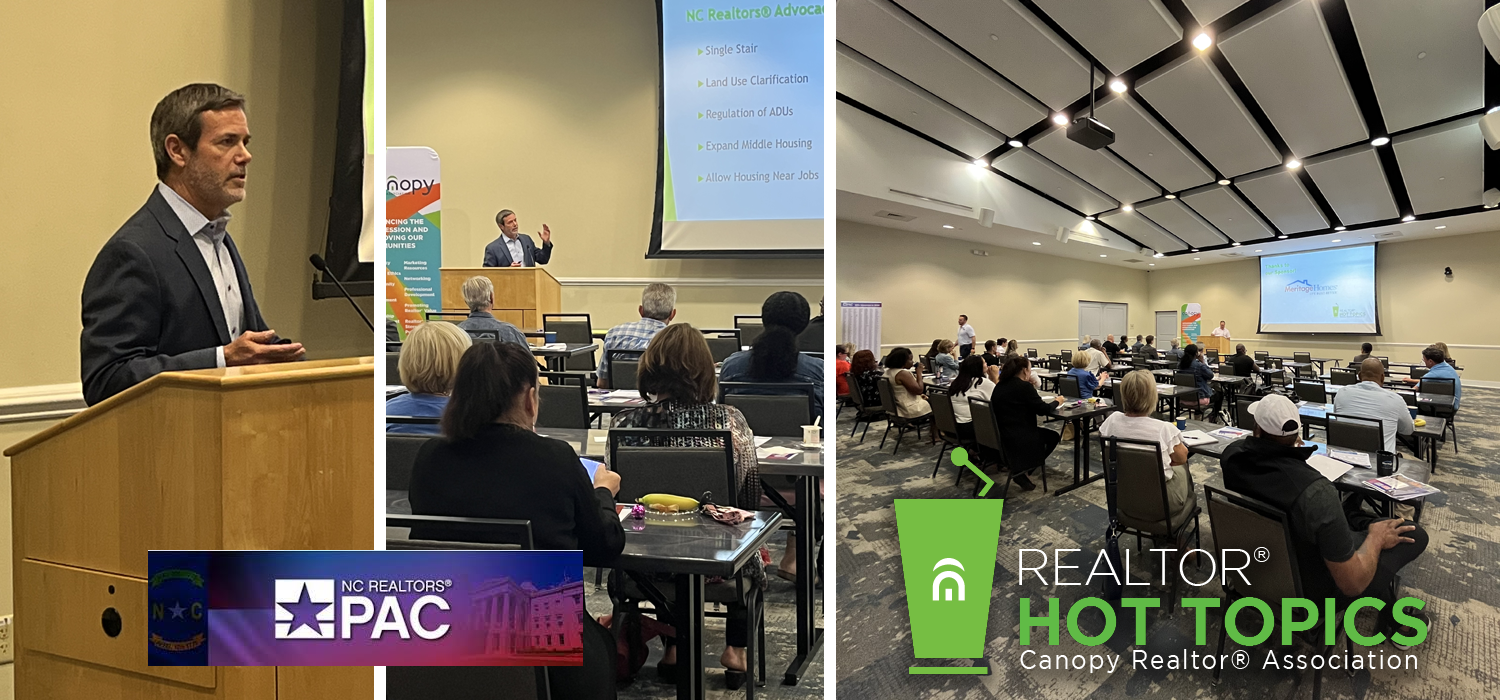 |
Last Friday, May 1st, The Charles Mack Citizen Center in Mooresville was the scene of a highly engaged session of leading northern regional Realtors® who wanted to become educated on legislative issues and property rights matters. In particular, questions centered around the disciplines of local, state, and national advocacy and how we can support leaders who understand that economic health and real estate development, building, and sales go hand in hand.
To kick off the meeting, we provided a thorough orientation of REBIC’s roles and mission, and how we’re moving vital issues forward. Designed to shed light on the pivotal actions of advocacy to ensure the strength of the real estate industry, I was joined by panel members David Coble, REBIC Area Advocacy Manager for Iredell County, and special guest James Pressley of Pressly Residential, as we defined the status of development, housing, and economic development in the Piedmont region. Also joining the panel were Sallie Myrick and Allen Dargins, who are both NC Realtors Region 8 RPAC Trustees.
Highlights of the conversation included an in-depth question and answer session around HB 765, helping to slash misunderstandings around a bill whose purpose is pretty clear – allow housing supply to catch up with the demand. With special attention given to the rampant misuse of power by some municipal leaders who more and more believe they have absolute control of how a landowner develops their own property, the panel responded to specific questions about subjects like density myths, traffic studies, local boards’ misuse of power, and zoning inequities. The goal was to equip the real estate professionals in the room with factual narratives to share when asked about these important issues.
The event ended with some vital statistics offered around the importance of supporting state, local, and national political initiatives. Canopy Realtor® members challenged each other to increase their support for these efforts and to recommit their efforts to increased engagement and advocacy.
My Take: Last week’s event was energizing! There are some exciting things happening in Iredell County and I was honored to be a part of it. I’m encouraged this could truly be a tipping point for folks in our industry. I’m hopeful that many came away realizing we can make a difference, and we do have a considerable voice, if we use it!
Yesterday Charlotte’s Transportation, Planning, and Development Committee held a meeting where Planning Staff provided briefings on the proposed Community Area Plans and a pending Unified Development Ordinance (UDO) text amendment. Presentations on both items are linked below:
Community Area Plans Presentation
UDO Text Amendment Presentation
Staff also mentioned a virtual webinar it is holding on Thursday, May 15th from 5:00-7:00pm. During the event, residents can join breakout rooms and participate in discussions about the Community Area Plan relevant to their neighborhood.
The webinar will be broken up into two parts. From 5:00-6:00pm, there will be breakout rooms for the West and North Plans. From 6:00-7:00pm there will be breakout rooms for the East and South plans.
Click here to find out which area plan impacts you.
Click here to register for the webinar.
The Public Hearing for the Community Area Plans is scheduled for Monday, May 12, 2025, at 6:30pm at the Charlotte-Mecklenburg Government Center.
Sign up through the City Clerk’s Office to share your voice and shape Charlotte!
My Take: We are getting closer and closer to the Charlotte City Council adoption of some pretty important elements of the planning and development process. If you have not done so already, please take a look at the proposed area plans. Two points of reference that may be helpful as you consider potential impacts would be pages 38-39 of the Program Guide (how minor amendments to the Policy Map are considered) as well as the video from the March Transportation, Planning, & Development Committee meeting that shows the process staff will use to analyze future rezonings. I’d also ask you to take a look at the current draft UDO text amendment that contains some important changes including flexibility for adaptive reuse projects, relief for developments with multiple frontages, and adjustments to research campuses.
This is a My Take Bonus: I’ve shared in several recent Two for Tuesdays the core elements of HB 765 (Omnibus Land Use). As you’ll read below in our Did You Know feature this week, there seems to be some confusion around the supposed sovereignty of local boards and commissions in controlling private property outcomes. When local elected officials abuse their power by denying projects that fit completely into their guidelines, comprehensive plans, or otherwise conform to state law, an affected developer’s only recourse is to litigate, a choice they rarely choose for fear of retribution. Accountability in government and in private business should be the norm, but it’s not.
That’s why bills like HB 765 are introduced and acted upon. Many local governments are artificially constraining the supply of housing and increasing the cost through their own actions. Despite this, and the efforts of several misguided interest groups, the bill did pass out of the House Housing & Development Committee earlier today and will be considered by the Rules Committee tomorrow prior to action in the full House either Wednesday or Thursday of this week.
BACK TO LATEST NEWS